Shobha Warrier
Kerala finance minister Thomas Isaac says the Leftist government in the state wants to develop an egalitarian society where there are no capitalists.
Dr Thomas Isaac, the 58-year-old finance minister of Kerala, is a well known economist.
He took his PhD from the Centre for Development Studies (affiliated to the Jawaharlal Nehru University). His stint in politics started as a member of the Students' Federation of India, the student wing of the Communist Party of India (Marxist).
As a member of the Kerala State Planning Board, he was in charge of the People's Plan Campaign (PPC) in Kerala. PPC is described as a landmark in the history of the decentralisation experience.
He was a Professor at the Centre for Development Studies in Thiruvananathapuram before he joined the LDF government in 2006.
In the midst of his campaign in Alappuzha, he spoke to rediff.com over phone on the Kerala economy and the challenges it faces.
Click NEXT to read how he thinks Kerala could become the fastest growing economy in India . . .
We are definitely against capitalists: Kerala FM
Image: A Kathakali dancer performs during a cultural programme in Kochi.Photographs: Reuters
Was there any conflict between the economist and the politician in you when you became the finance minister of Kerala?
No, there was no conflict. Both the roles are complimentary. When you become the finance minister of a state, you are getting a rare opportunity to put into practice some of the ideas you have been advocating till then as an economist.
Second, an economist has certain analytical skills, more than a non-economist. It is much easier for me to conceptualise the fiscal character or the implications of various policies as I am an economist.
So I think it is advantageous that I have an economics background. There cannot be any conflict.
What was the most challenging aspect of your job as finance minister?
Finance ministers don't meddle too much with the revenue side. They are more concerned with the expenditure side. So they kind of become regulatory persons.
But I have chosen the revenue side as my primary area to work on. In fact I spent much of the time overhauling the tax administration. That gave me a lot of manoeuvrability.
The expenditure of the state government has in fact more than doubled in these five years. Since revenues have been buoyant, we didn't have financial difficulties.
. . .
We are definitely against capitalists: Kerala FM
Image: A truck passes shipping containers stacked at the Container Terminal at the Cochin Port.Photographs: Reuters
As an economist, how do you look at the Kerala economy which is largely dependent on money that comes from abroad?
Five decades ago, at the time of its formation, Kerala was a typical under-developed region with low levels of per capita income, consumption, savings, investment, and slow growth.
In 1957-58, the per capita income of Kerala was estimated to be nearly 20 per cent lower than the national average.
Kerala's economic growth began from the late-1980s and the state's per capita income moved above the national average.
There has also been acceleration in economic growth from the late-1980s. There has been a remarkable increase in the consumption levels and Kerala today ranks first among all states in the rankings of consumption expenditure.
Kerala has the highest rate of increase in bank deposits among all states. Kerala economy today is one of the fastest growing economies in India. Our growth rate is about one percent more than the national average.
Yes, this is by means of remittances and by expansion of consumption services. The challenge is to link this aspect to the production sectors of the economy.
. . .
We are definitely against capitalists: Kerala FM
Image: Thomas Issac, the Kerala finance minister.Photographs: Rediff Archive
But Kerala is not getting industrialised like the other states in India....
Kerala has to change from the current path of development.
Earlier, industrial development was focused on the energy-intensive chemical industries. An important reason for this was the perceived availability of cheap hydroelectric power.
However, by the 1980s, Kerala was facing chronic power-shortages, power rationing and power cuts, and that crippled the growth of large industries.
Kerala also lost its early advantage over other Indian states with respect to the cost of electric power. There were constraints with respect to the marketing of chemicals and allied industrial goods produced in Kerala.
There have also been popular protests against the pollution of air and water by chemicals-producing units. All these factors limited the expansion of the chemicals-dominated, modern industrial sector of Kerala.
We are a labour-scarce economy in terms of production, and wages have also risen.
. . .
We are definitely against capitalists: Kerala FM
Image: A labourer arranges pineapples at a wholesale pineapple market in Vazhakulam.Photographs: Reuters
What changes are needed at the policy level so that Kerala has industries?
We have to now concentrate on the 'knowledge-based' industries, such as information and communication technology (ICT), and biotechnology. Also we must focus on skill-intensive industries, such as light engineering, and service industries, such as tourism. The future model of industrialisation of Kerala should be like this.
Industrialisation in Kerala has involved relatively low levels of investment in the areas I have just mentioned.
So, we have to shift our focus to new industries that are knowledge-based, skill-based or service-based. These are areas where Kerala has proficiency.
But you need to have very major investment in infrastructure which will make Kerala attractive to investment in these sectors.
We also have to invest much more in education, in power, roads, improvement in connectivity, and so on. So this is the programme that we are putting forward.
Evidence from various countries clearly indicates that effective state intervention is crucial for a region's success in knowledge-based industries.
For instance, government intervention in setting up high technology industries and in education and research was the key to the success of Taiwan and South Korea in high technology industries and services.
. . .
We are definitely against capitalists: Kerala FM
Image: An Indian fisherman carries a basket containing fish in Kovalam Beach.Photographs: Reuters
Kerala lags behind while Bengaluru, Hyderabad, Chennai, Pune, etc surge ahead in attracting knowledge-based industries...
Yes, the current status of the ICT industry in Kerala relative to that of India is very poor.
Even though Kerala was the first state in India to take definitive steps towards building an electronics industry, total sales revenue in the ICT industry in Kerala as a share of total revenue in the ICT industry in India was only 2.5 per cent.
Few states in India have Kerala's advantages to exploit the possibilities offered by ICT. Kerala's advantages include better human resource development, availability of low-cost professionals at the entry level, excellent connectivity like highest telephone density and international gateway presence at Kochi and significantly lower operational costs compared to other cities.
To make use of these opportunities, a concerted effort has to be launched to overcome the existing disadvantages of the state, such as shortage of middle and senior level professionals, inadequate power supply, insufficient industrial park area and facilities and poor perception of the state as an investment destination.
. . .
We are definitely against capitalists: Kerala FM
Photographs: Rediff Archive
As a Left-leaning politician, do you hold the Left responsible for the state not getting industrialised?
No. In fact, I think we only are looking forward to a very bold programme for infrastructure development. I have put forward a road map in the budget for the creation of a Special Purpose Vehicle, to which the government will provide 50 per cent of the motor vehicle tax, and capitalising the future revenue flow, they would borrow heavily to undertake the investment in roads.
Our plan is for investment of about Rs 40,000 crore (Rs 400 billion). This has been the highlight of the most recent budget.
What about trade unionism which does not allow industries to flourish in the state?
When this government came to power, the overall annual loss of the public sector industries was Rs 96 crore (Rs 960 million). Now all these public sector units are running on profit and the profit exceeds Rs 300 crore (Rs 3 billion).
We managed this by improving the management, changing the technology, higher investment, etc. The question is, if the public sector can perform in Kerala so well, why not other industries?
. . .
We are definitely against capitalists: Kerala FM
Image: Indian farmers ride their oxen during a cattle race to mark an agricultural festival near Kochi.Photographs: Reuters
Do you agree with the attitude of the workers towards capital and capitalists?
In the initial phase of trade union movement, every attempt to unionise was thwarted by the capitalists. After so many years, the trade union movement in Kerala has matured.
In fact, by any measure of industrial unrest, like the production days lost, the number of strikes, etc in Kerala is below the level of the national average for the last two decades. The percentage of man-days lost as a result of labour disputes in Kerala is below the national average.
In fact, what Kerala needs is not an anti-labour approach, but a labour-friendly approach in industrial relations, which would gain the confidence and co-operation of workers in efforts to raise productivity.
Nevertheless, there are certain unhealthy labour practices in certain sectors related to transportation and construction that create bottlenecks for smooth establishment of industrial units.
These practices have to be collectively reviewed and rectified on the basis of a consensus. The trade union movement itself has self-critically acknowledged such deviations and proposed measures to counteract them.
An outstanding feature of labour organisation in Kerala is that it has brought in informal sector workers into its fold while informal sector workers in other parts of India continue to survive under oppressive working conditions.
Wage rates of informal-sector workers in Kerala have risen above the corresponding Indian averages and the corresponding wage rates in neighbouring states.
. . .
We are definitely against capitalists: Kerala FM
Image: Caparisoned elephants participate in the Trichur Pooram festival at Trichur.Photographs: Reuters
Industries are reluctant to come to Kerala...
Recent studies on the investment climate in Kerala have shown that the state ranks at the top among all states with respect to the objective indicators and subjective indicators of investor sentiment.
A World Bank study on the investment climate in 16 Indian states for the year 2005 shows that 'Kerala consistently scores better than average on most objective and perception indicators'.
Faster growth in the industrial sector requires more investment, which has to come from private sources within and outside the state. To become an attractive destination for investment, the state needs to identify the major factors that have led to the perception of investment-unfriendliness and adopt corrective measures.
Even if we give opportunities to accelerate growth in the production sectors, which we are trying to do, this misconception about Kerala being labour-militant, capital-hostile, etc is one issue which we have to overcome.
Starting with the liberation struggle in 1959 (Congress-led uprising against the then Communist government, which resulted in the Union government using Article 360 for the first time to dismiss a state government), this misconception has been created by the propaganda of those who are against the trade union movement.
. . .
We are definitely against capitalists: Kerala FM
Image: Tourists visit Fort Kochi beach in Kochi.Photographs: Reuters
Do you hold all the political parties responsible for Kerala not getting industrialised like the neighbouring states?
You must understand that Kerala has taken a different path of development which, I think, people have appreciated internationally.
Kerala has chosen a path of development that focusses on the social sector. The quality of life in Kerala is much better than in the rest of India.
The average, ordinary citizen of Kerala has a much better quality of life, and the life expectancy must be higher by about ten years. The problem has been that the economic growth rate is poor.
Now we have seen a virtual cycle of growth. The investment is in human resources and we have enabled the unemployed in Kerala to go abroad or to other states and get jobs. This has resulted in greater inflow of remittances.
Is it sustainable for an economy to grow based on remittances from outside, and less of creation of wealth inside?
No. If something happens to remittances, then you are stuck. Therefore, you use this opportunity to use the remittances within Kerala and develop domestic production sectors. Then it is sustainable.
. . .
We are definitely against capitalists: Kerala FM
Image: Musicians perform during the procession at the Pooram festival held at the Vadakkumnatha temple.Photographs: Reuters
Do you approve of globalisation, liberalisation and market economy?
The hallmark of agricultural and industrial production in Kerala is the predominance of small-scale and petty forms of production. These small-scale units are considerably integrated with national and international markets.
Therefore, the terms of trade are vitally important for the viability of small-scale production. The sharp decline in the product prices due to liberalisation of imports combined with rising input prices due to reduction in subsidies have been disastrous for the agrarian economy of the state.
The neo-liberal reforms have pushed these small-scale sectors of Kerala's economy into an unprecedented crisis.
Kerala has always been exporting to global markets. It was an export-oriented regional economy but the question is not whether we should open up or not.
During 2005-06, the volume of exports of marine products from Kerala was 97,311 tonnes, an 18 per cent share of the overall marine products export from India. In 2005-06, Kerala's share in the country's coir exports was 93 per cent, cashew kernels 65 per cent, spices 38 per cent, coffee 55 per cent and tea 26 per cent.
The question is how much autonomy can you give? Can we continue to have the present reforms and globalisation? We consider it very detrimental to our economy.
. . .
We are definitely against capitalists: Kerala FM
Photographs: Rediff Archive
Which sectors should not be opened up according to you?
Agriculture is one area that should not be opened up. For example, we have the long-gestation tree crops and immediate changes in productivity will affect the farmers. And opening up can have a very severe deleterious impact on our agriculture. Therefore we don't want the agricultural sector to be opened up or liberalised.
Second is the financial sector. That is because it is the backbone of 30 per cent of your population; you cannot allow it to be completely under market forces.
I say it again: agriculture and the financial sector should not be opened up to the multinational corporations.
What do you think is the best economic model for a country like India?
I would say, Kerala.
. . .
We are definitely against capitalists: Kerala FM
Image: Oarsmen row their boat during a practice ahead of the Nehru boat race in Alleppy.Photographs: Reuters
Could you expand on that?
What is economic growth after all? It is providing the necessities of life to people. We have provided primary healthcare, housing, education, basic human rights . We have provided for the needs of the people and that is the greatest achievement of the economy.
Is not wealth-creation also important to sustain that?
As I told you, we have entered a phase of wealth-creation. We are growing much faster than the national average. And my calculation is that Kerala is going to be the fastest growing regional economy in India in another five years.
Are you against capitalists?
Definitely! We are for a system where there are no capitalists.
Our agenda certainly is not that because we can't achieve that within Kerala alone. Therefore, while keeping this ideal, we would like to develop a more egalitarian society.
. . .
We are definitely against capitalists: Kerala FM
Photographs: Reuters
Do you feel the people of Kerala are happy with the way the Kerala economy is growing and the quality of life in Kerala?
Definitely! I think the rating of the LDF government by the people is very good.
Is there any particular economy in the world that you admire?
Every economy has its pluses and minuses. You can say China is an economy that is growing very fast.
I would say what we have achieved in Kerala is something very creditable, something which I am very proud of, though I do accept there are many new contradictions that are emerging, new challenges, which we are trying to address.
I think Kerala does provide an alternative to what is going on in India.

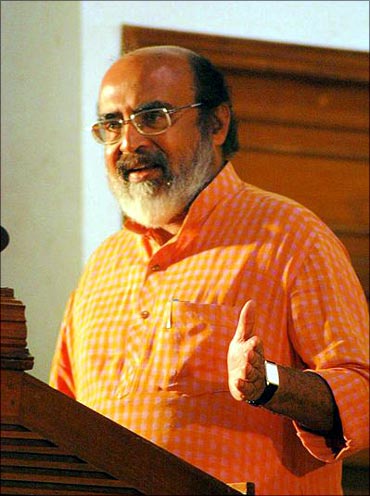

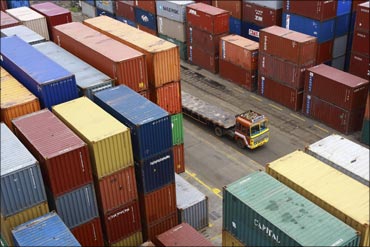
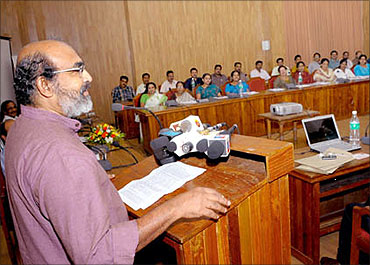

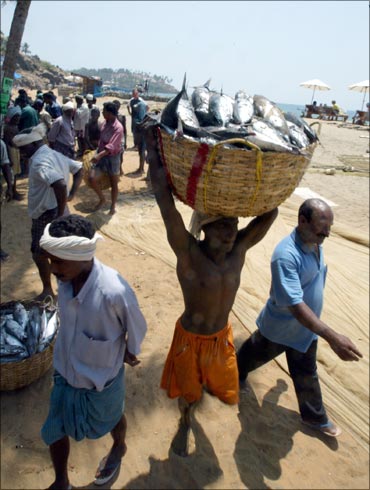

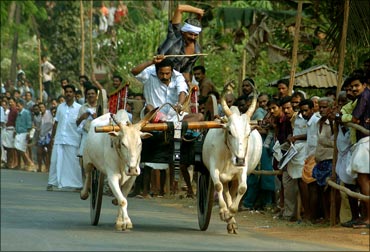

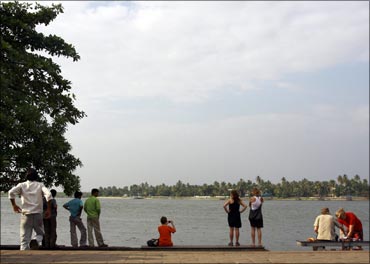
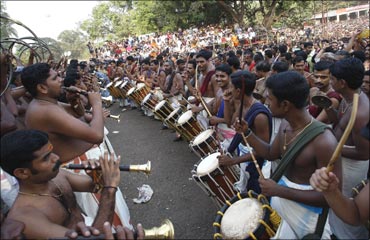
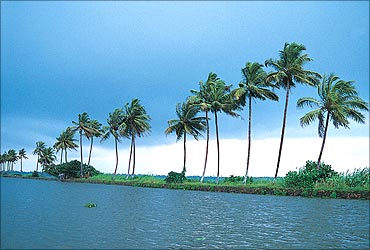
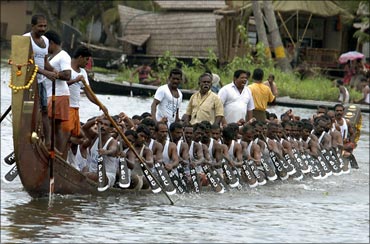
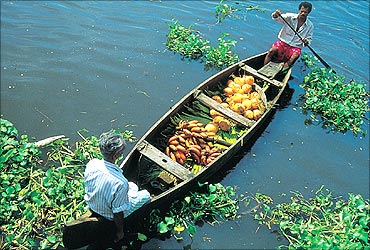
article